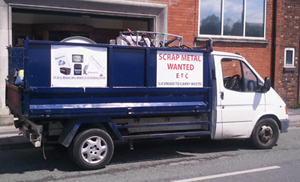Scrap Metal Dealer Licence
Scrap Metal Dealers Act 2013
Summary
 The Scrap Metal Dealers Act 2013 (the Act) was passed on 28 February 2013 and came into force on 1 October 2013. The new Act replaces the Scrap Metal Dealers Act 1964 and part of the Vehicle Crime Act 2001 that deals with motor salvage operators.
The Scrap Metal Dealers Act 2013 (the Act) was passed on 28 February 2013 and came into force on 1 October 2013. The new Act replaces the Scrap Metal Dealers Act 1964 and part of the Vehicle Crime Act 2001 that deals with motor salvage operators.
Background information
There has been an increase in metal theft with the increased value of metal across the UK as a whole. A wide range of sectors have been hit including national transport, electricity and telephone links, street furniture, memorials, commercial and residential buildings including Churches and schools.
The Government introduced initial changes in 2012 that took steps to prohibit cash payments for scrap metal and amend the powers of entry into unregistered scrap metal sites and increase the existing financial penalties for offences under the Scrap Metal Dealers Act 1964. These changes were brought in under the Legal Aid, Sentencing and Punishment of Offenders Act 2012.
Key features of the Act
The aim of the legislation is to revise the regulatory regime for scrap metal dealing and vehicle dismantling and to give the Police and Local Authorities more powers to refuse and revoke licences as well as greater rights of entry and inspection.
The Act brings in two types of licences;
- Site Licence
- Collector’s Licence
A person can only hold one licence in a Local Authority’s area but can hold a licence in more than one local authority.
An applicant for a licence must be suitable and the local authority, when determining suitability, can have regard to:
- Whether the applicant or any site manager has been convicted of any relevant offence
- Whether the applicant or any site manager has been the subject of any relevant enforcement action
- Any previous refusal for issue of or renewal of a scrap metal licence
- Any previous refusal for an environment permit or registration
- Any previous revocation of a scrap metal licence
- Whether the applicant has demonstrated that there will be adequate procedures to comply with the Act
All of the above will apply to any director, or any secretary of a company if the applicant is not an individual.
Once an application has been received the local authority must consult with:
- Any other local authority (if an application has been made or licence issued to the same applicant)
- The Environment Agency
- The Police.
The Act has also introduced the requirement for the Environment Agency to keep and maintain a register of scrap metal licences issued in England and that register will be open for public inspection.
The Act will introduce the requirement for scrap metal dealers to verify the identity and full name and address of the metal supplier and keep copies of proof of identification. In addition the dealer must keep records of the type of description of the metal(s) including weight and identifying marks, the date and time of receipt, the vehicle registration of any vehicle delivering the metal and copies of cheques used to pay for metal. All records must be kept for 3 years.
The Act also prohibits the payment of cash for metals.
Local Authority and Police Officers have been given powers to inspect licensed premises and can require production of any scrap metal at the premises, inspect records kept and take copies of those records. The Act provides police or local authority powers to issue closure notices to unlicensed scrap metal dealing premises and apply to a justice of the peace for a closure order.
How to Apply
Guidance Letter
Click here to download the guidance letter on applying for a scrap metal dealer’s licence.
Application Form and Guidance Notes
Click here to download the application form and guidance notes.
Fees and Charges
Click here to find out Tameside MBC’s Fees and Charges for licences.

